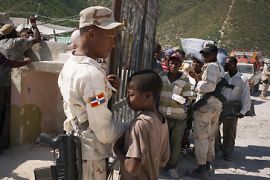Thousands flee Haitian capital
Many residents leave quake-ravaged Port-au-Prince to seek food and safety elsewhere.

Thousands of Haitians are continuing to flee the capital, Port-au-Prince, fearful of aftershocks and concerned at the bleak prospects for work and normal life following the deadly earthquake of January 12.
Tony Birtley, Al Jazeera’s correspondent reporting from a port near the Haitian capital, said on Friday that the initial trickle of refugees has “become a flood”.
“The Haitian government is providing free buses for people to leave Port-au-Prince, others use any means of transportation they can”, Birtley said.
“And the harbour is operating at full capacity, up to seven thousand people a day are leaving by sea.”
Vinnie Filibert, a refugee, explained why so many are choosing to leave.
“Everyone is trying to survive but I know tomorrow there is going to be another stage it’s going to be the reality. They are going to have to face the reality of no job, no house, no prospects and they are going to have to fight to stay honest.”
Rose Marie Charles, another refugee, told Al Jazeera: “I lost my son, my daughter and two brothers. I don’t understand my country anymore. I don’t know how to help myself. I just had to get away to the country.”
There was a rare moment of hope on Friday when an elderly woman was rescued from under the rubble of her collapsed Port-au-Prince home.
Marie Carida Roman, 84, was believed to be the first person to be rescued from the debris since two children were found alive on Wednesday.
Relocating the homeless
Meanwhile, Haiti’s government has announced plans to move about 400,000 homeless people to new villages to be built outside Port-au-Prince, as over a million people were left homeless by last week’s earthquake.
| special report | |
|
Paul Antoine Bien-Aime, Haiti’s interior minister, said that in the first phase the government would move 100,000 refugees to tent villages of 10,000 each near the town of Croix Des Bouquets, north of Port-au-Prince.
But some Hatians are uneasy about the move.
Jean-Louise, whose daughter-in-law was killed in the earthquake, told Al Jazeera she was fearful about what leaving the capital would mean for her family.
“The capital is very bad right now but not everyone can move because some people have everything here … my life is here, my son, he works at the American embassy. If I move, I don’t know what the situation will be like,” she said.
Food-for-work
The government move comes as ordinary Haitians struggle to find food, water and medicine in the aftermath of the earthquake that left thousands dead. Some aid agencies say up to 100,000 to 200,000 people may have perished in the disaster.
Much of the capital and several towns have been left in ruins by the magnitude 7.0 quake, crippling infrastructure and leaving residents destitutes.
Brazilian UN peacekeepers have begun levelling land in Croix des Bouquets to set up a transitional tent camp at a site where the Inter-American Development Bank planned to help build permanent houses for 30,000 people.
The initiative would let displaced Haitians help build their own new homes under a food-for-work scheme, allowing them to stay close to the area where they had made a living.
The capital’s seaport has now been repaired enough to reopen for limited aid shipments, with a Dutch naval vessel unloading pallets of water, juice and shelf-stable milk onto trucks at the pier.
Aid is becoming more plentiful but is still inadequate to feed and shelter the thousands of victims.
Hungry residents
Many are currently jammed into haphazard, open-air camps with no latrines, sleeping outdoors because their homes were destroyed or out of fear that aftershocks would bring down more buildings.
| In video |
|
Al Jazeera’s Rob Reynolds that some elements of normality are beginning to return |
Al Jazeera’s Gabriel Elizondo, reporting from one camp in Cazeau in Port-au-Prince, said: “There is rubbish on the ground, no running water, no electricity and the people here have had no food or water in over a week now.
“There has been no aid. We are the first people – outsiders – that the people here say they have seen and we are only a couple of kilometres from the airport.”
Banks were scheduled to reopen on Saturday in Port-au-Prince, giving most Haitians their first access to cash since the earthquake hit, Josseline Colimon Fethiere, the country’s commerce minister, said.
Some bank branches were demolished in the earthquake but the banks planned to share customers, and to stay open on Sunday, she said.
However, most of the basics of city life were still missing or barely functional in Port-au-Prince.
Untreated wounds
Hospitals were overcrowded and doctors lacked anaesthesia, forcing them to operate on wide-awake patients with only local painkillers.
Doctors Without Borders said there were 10- to 12-day backlogs of patients at some of its surgical sites and they were seeing infections of untreated wounds.
“Some victims are already dying of sepsis,” the group said.
Aid groups have brought in mobile kitchens and bakeries but still struggling to feed the hungry.
The World Food Programme (WFP) estimated there were 200 homeless encampments in Port-au-Prince alone and urged the government to begin consolidating them to streamline aid distribution.
“We will probably need to feed between one to two million but it depends on the rate at which people leave the city,” Thiry Benoit, WFP’s deputy country representative in Haiti, said.
Port-au-Prince’s water system was only partially functional but tanker lorries have begun to deliver water to makeshift camps, with people lining up to fill their buckets.
